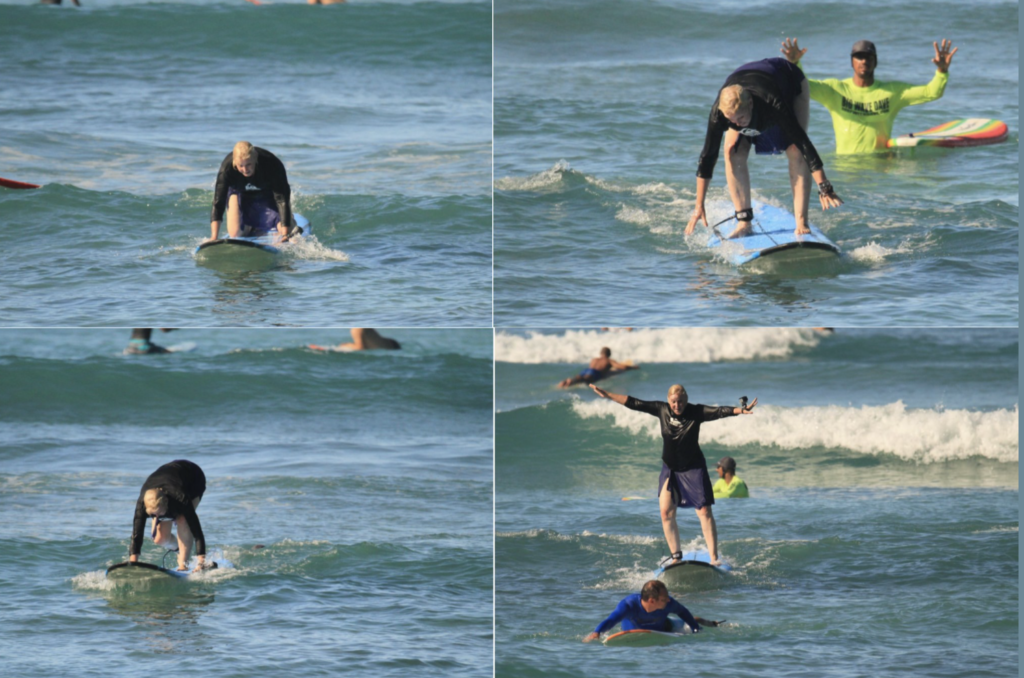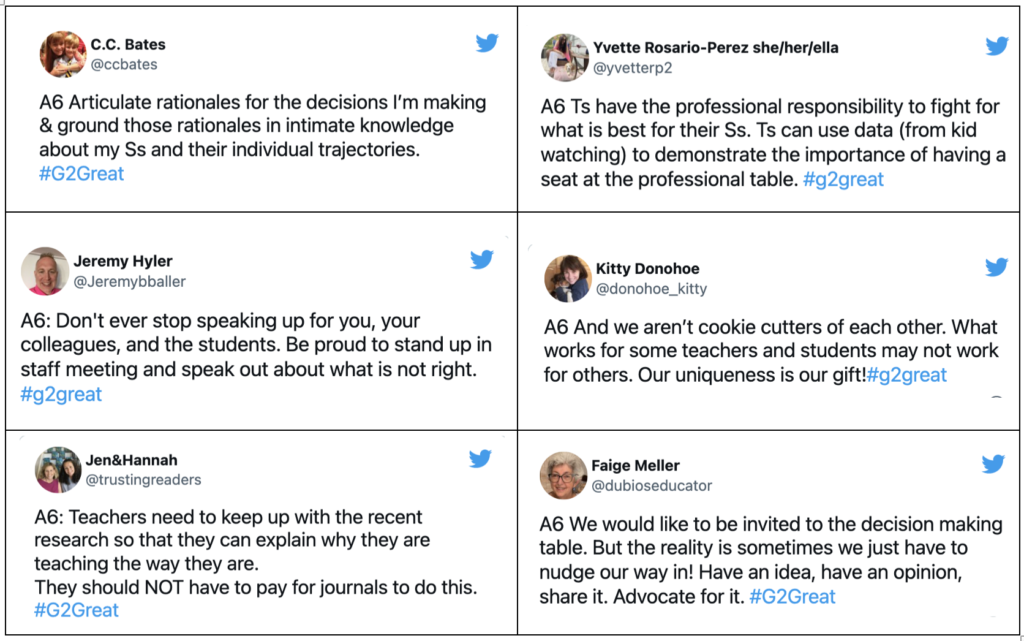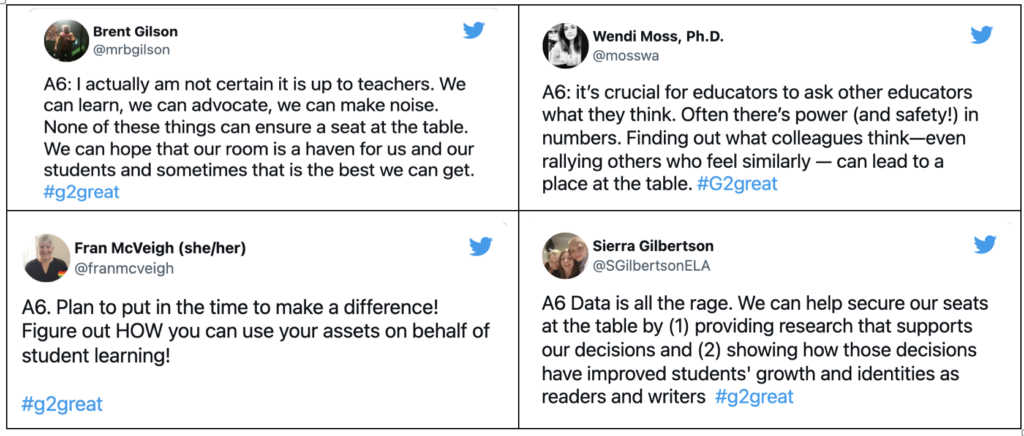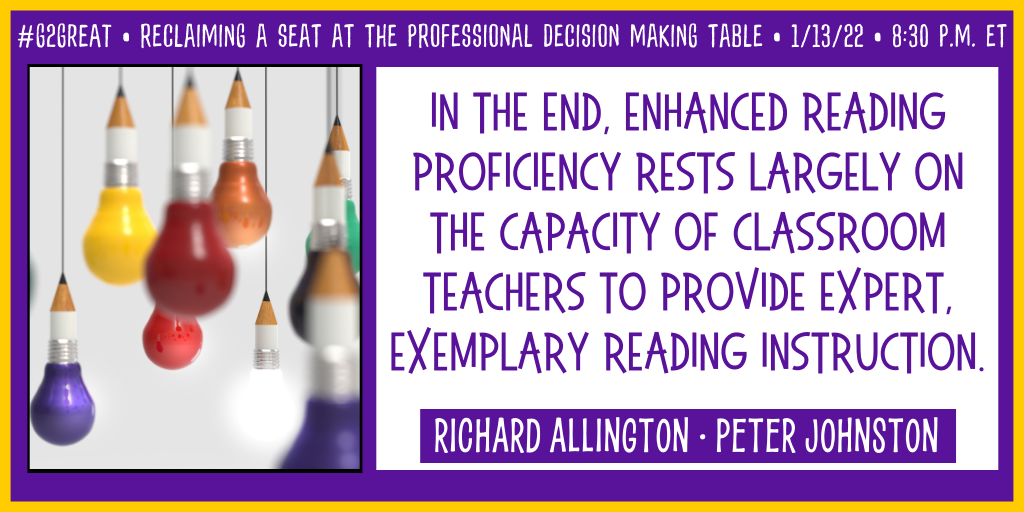by Mary Howard

You can access our Wakelet chat artifact using this link
Last week, #G2Great celebrated our seventh anniversary with a fitting topic for a twitter chat home: Lifting Our Professional Voices in a Collective Gathering Space. Our commitment to #G2Great chat for six years and counting reflects our deep respect for collaborative conversations where collective voices can ignite in joyful harmony. For week two following our year seven anniversary, we chose a topic that felt like a timely chat transition: Reclaiming a Seat at the Professional Decision-Making Table.
One needs only to look at the state of education to understand why this is an essential topic. At a time when mandates and controlling political initiatives are at an all-time high, educators are being held captive by demands for obligatory acceptance. The ease for companies to tout their suspect wares for a hefty price has burgeoned out of control, exacerbated in a pandemic where the ‘learning loss’ narrative masks a hard core sales pitch. This is complicated in that those with control of the purse strings often have little if any educational background but are motivated by a personal agenda. Add growing self-proclaimed experts with a cause and a rally cry of “The Science of Reading” and we find ourselves caught in a political tsunami. Suddenly our coveted seat at that professional decision-making table has become a dreaded seat at a decision-taking table.
These challenges have put up one roadblock after another for educators who desperately want the freedom to make decisions in honor of children. This freedom can be the difference between a grab and go mindset vs informed choices driven by a responsive view of the teaching/learning process. It would be illogical to argue whether teachers deserve a seat at that decision-making table knowing that our ability to make decisions that are grounded in deep understandings is the tipping point to our success as professionals and to the success of our students’ as learners. Therefore, in this post, I won’t argue our right to have a seat at that table, but why that seat and the freedom to make decisions comes at a price. So let’s pause so that I can approach this topic with a connection to my life experiences.
I have been a frequent visitor to Honolulu, Hawaii for years, working with schools before lingering awhile to soak in the island beauty. During these visits, I’ve taken countless lessons to become a surfer. I use the word “surfer” loosely since I’m not known for the much-needed grace and balance that actual surfers possess. Since a picture really is worth a thousand words, my visual collage below reflects one of my early surfing excursions. As you can see, my style seems to spread terror across the Waikiki waters, as evidenced by the horrified face of my instructor coaching me from behind the scenes and the ill-fated man ahead of me about to be mowed down by a little old lady perched on a wobbly piece of wood devoid of brakes. In my defense, I failed to notice him because I was too busy celebrating a long awaited prone position but I am very happy to announce that no human was harmed during my early learning attempts.

Video of early surfing lessons with what I learned about teaching link
So why do I share this? After five decades in education and long-time work with schools across the country, I believe that it’s important for us to relive what it feels like to be a novice now and then. Committed learning even when it’s hard illustrates the “price” we pay for the professional freedom we say we desire. I owed it myself and those around me to do all I could to learn how to surf so that I could gain new understandings and skills over time. Although I have definitely improved after countless lessons, I’m not sure that I’d want to be in the same ocean with me given my still shaky status that continues to this day. Without lessons and the patient support of coaches, I suspect that my face may well have appeared on the front page of the Honolulu Star Advertiser newspaper that day.
Surfers are no different than teachers. A skilled surfer is like a skilled teacher in that both recognize their obligation to their chosen field to respect the rights of those they serve by paying the price of unwavering commitment to learning and the rewards of our efforts: Knowledge. Experience. Dedication. Determination. Practice. Study. Collaboration. Patience. Reflection. Repeat. Repeat. Repeat. Both surfers and educators dedicated to their profession work for years to hone their skills in a never-ending quest. And just like teachers, surfers understand that each surfing experience and those who share the water with them are unique and different, thus requiring different responses for each situation.
I began teaching in a special education room in small town Missouri in 1972. Nary a resource or wise piece of advice was ever offered to me in that first year. I entered my tiny special education room armed only with my love for children and my determination to become the best teacher I could possibly be. Knowing now what a negative impact rigid adherence to programs can have, I consider it my good fortune not to have been tethered to shallow “stuff”. My enthusiasm, my willingness to learn, and my steadfast desire to do right by my kids kept me in a perpetual state of inspired learning. Yes, I was uncertain often in those early days. Yes, I made many shaky choices. Yes, I had to change direction often. But those early missteps set me on a path to seek better choices. In those early years, I embraced my imperfections and saw this as a gift in the form of a gentle nudge to the new thinking I needed. My success as a teacher was reflected by the success of my learners which earned me the right to sit at the professional decision-making table. I am still joyfully paying that price all these years later when my learning means as much to me now as it did then. If we stop learning, we are doomed to stagnate and our children are doomed to pay that price.
FINAL THOUGHTS
These are hard times in education folks. Teachers everywhere are being told what to do and how to do it, what not to do and what to do instead, and even how to think (or how not to think even when they know better). But in hard times where politically fueled mandates and directives have taken over our schools, it is more important than ever for us to lead the life of responsible professionals driven by a quest for knowledge and the research and experience that feeds that knowledge. I cannot repeat often enough that this is the price we pay for a seat at the table. We talk about teacher agency, but agency comes with responsibility to the learning that prevents us from mindlessly reaching for a script or shallow activity just because it’s there. We read. We study. We explore. We question. We discuss. We research. And then we do it all again. Seth Godin reminds us that “Nobody dabbles at dentistry” so we refuse to ‘dabble’ as educators and instead work to “be extraordinarily good at whatever it is that we do.” If we truly desire professional freedom, we must first make a commitment to professional knowledge in the name of our own growth process.
Yes, I believe that schools have a clear responsibility to create a culture of professional learning that would help us all to do that, but the ignorance of schools for not doing so does is not a free ride for professional responsibility. Even if we find that our seat at the professional decision-making table is under lock and key, we have options if we so choose to explore them:
• Don’t wait for permission to take your place at the decision-making table; take that seat armed with references that show that you belong there. Become a dedicated action researcher who seeks evidence of learning in action. The seat is there but you may have to show that you deserve the trust of others first.
• Build a mini professional decision-making table and invite some like-minded others who are equally determined to make decisions for students. Explore the real life informants of living breathing humans and what this tells us about next steps decision-making Start a revolution with a team to support you.
• If these things don’t work, then create an intimate table for one where you have a space to use your knowledge to awaken your freedom to make choices. You may be surprised how your determination will inspire and entice others to join you. Change often with begins with one person. Be the one!
WISE ADVICE FROM OUR #G2Great CHAT


In 2012 I wrote the words that continue to guide my thinking in the book that launched #G2Great chat, Good to Great Teaching: Focusing on the Literacy Work that Matters (Heinemann, 2012). My quote explains why we can never give up our quest to take our rightful seat at the professional decision-making table.
With each tick of the instructional clock, we can lift students to great heights of learning or hold them cognitive hostages in an instructional dead end. Great work doesn’t happen by chance, it’s a conscious choice we make using a new mind-set that forever alters our thinking. (page 93)
As I type these words, many educators are being forced into that instructional dead end and told that that are incapable of making decisions so therefore they need a fail proof fidelity box to follow with a vengeance. For some, this may seem like a blessing but for most of us it is a travesty of injustice to our role as professionals and to children who depend on us to behave like professionals.
There is a dangerous power game in progress in far too many schools and it is forcing teachers to play follow the leader in a mindless version of what teaching is all about. We can play this game and succumb to the pressure of power plays, or we can pick the battles that matter most based on our growing knowledge of research, children and meaningful assessments that help us to make the best possible decisions. Combine this with reflection that turns our teaching inward, and move us from teaching as an act of mindless DOING to teaching as an act of responsive THINKING. When we take time to internally ponder our own choices and how those choices support or hinder learning, we then embrace a higher professional purpose that can lead us to change. I’d say that’s a lofty goal that is well worth the effort.
Yes, professional freedom comes with a price, but the payoff is priceless.
